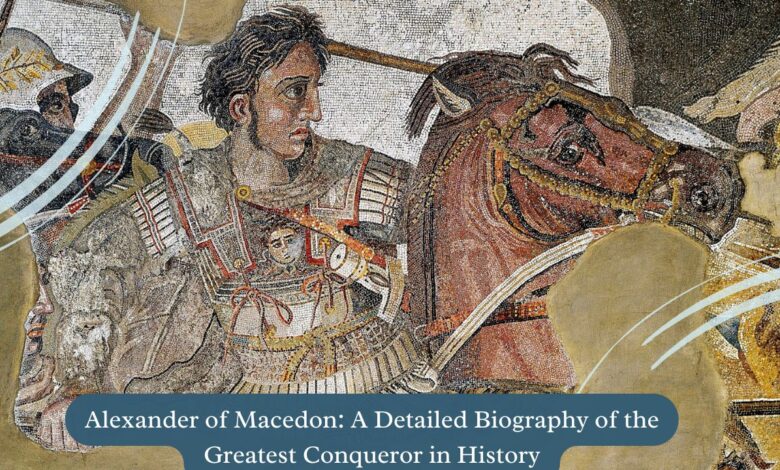Alexander of Macedon 3 Biography of the Greatest Conqueror in History

Alexander of Macedon, widely known as Alexander the Great, is one of history’s most extraordinary figures. Born in 356 BCE, he ascended the throne of Macedonia in 336 BCE and, within a few short years, carved out one of the largest empires the world had ever seen. His life, full of military conquests, political intrigue, and cultural influence, has left an indelible mark on history. This article explores his life in detail, from his early years to his death, and examines how his legacy has endured over the centuries.
Early Life and Education of Alexander of Macedon
Alexander was born in Pella, the ancient capital of Macedonia, to King Philip II and Queen Olympias. His mother was a deeply religious woman, and her belief in Alexander’s divine origin was instilled in him from a young age. Olympias told him that he was descended from both Zeus and Achilles, which contributed to his sense of destiny and greatness.
From the age of 13, Alexander was tutored by the philosopher Aristotle, one of the greatest minds of the ancient world. Under Aristotle’s mentorship, Alexander learned philosophy, science, medicine, and literature. He was particularly inspired by the works of Homer, especially the Iliad, which fueled his dream of becoming a heroic warrior-king. His education helped mold him into a well-rounded leader with a deep appreciation for both strategy and culture.
Jeff Lerner Entrepreneurial Journey, Net Worth 2024 and Success
Alexander of Macedon Ascension to Power
In 336 BCE, when Alexander was just 20 years old, his father Philip II was assassinated by a bodyguard, Pausanias. The circumstances surrounding Philip’s death remain unclear, with many speculating whether Olympias or even Alexander himself may have had a role in the plot. Regardless, Alexander swiftly eliminated potential rivals to the throne, solidifying his claim to the Macedonian kingship.
Immediately after taking the throne, Alexander faced revolts from several Greek city-states. His response was swift and decisive, demonstrating his military prowess. He razed the city of Thebes to the ground as a message to other rebellious states, which ensured the loyalty of Athens and other cities.
The Campaign Against Persia
Alexander’s most famous campaign began in 334 BCE, when he set out to conquer the vast Persian Empire, ruled by King Darius III. His motivation was twofold: to exact revenge for Persia’s invasions of Greece a century earlier and to fulfill his father’s ambition of conquering Persia.
His first major victory came at the Battle of Granicus, where he defeated a much larger Persian army. This set the stage for his legendary campaign, in which he led his forces through Asia Minor, Syria, and into Egypt. His tactics, often involving fast cavalry strikes and innovative battlefield formations, allowed him to win battles against overwhelming odds.
In 333 BCE, Alexander faced Darius III at the Battle of Issus, where his brilliant tactics forced the Persian king to flee, leaving his army to be decimated. Alexander then marched into Egypt, where he was welcomed as a liberator and was crowned Pharaoh in 332 BCE. It was in Egypt that he founded the city of Alexandria, which would become one of the most important cultural centers in the ancient world.
The Battle of Gaugamela and the Fall of Persia
In 331 BCE, Alexander of Macedon faced Darius III once again, this time at the Battle of Gaugamela. Despite being outnumbered, Alexander’s tactical genius and the discipline of his Macedonian phalanx once again led to a decisive victory. Darius fled the battlefield, and his empire soon collapsed.
Following his victory at Gaugamela, Alexander marched to the Persian capital of Persepolis, where he symbolically burned the palace of Xerxes I, avenging the Persian sack of Athens a century earlier. By 330 BCE, Alexander had conquered the entirety of the Persian Empire, making him the ruler of the largest empire in the world at that time.
The Journey to India
Not content with his conquests in Persia, Alexander sought to expand his empire even further. In 327 BCE, he launched an ambitious campaign into India, where he encountered fierce resistance from local rulers. The most notable of these was King Porus, whom Alexander defeated at the Battle of the Hydaspes River in 326 BCE. Despite the victory, the campaign in India was grueling, and his soldiers, exhausted and homesick, eventually mutinied, forcing Alexander to turn back.
Alexander’s journey back from India was marked by hardship, as his army faced scorching deserts and hostile terrain. Despite the challenges, he maintained his hold on the vast empire he had built, governing from his new capital in Babylon.
Alexander of Macedon Death and the Division of His Empire
In 323 BCE, Alexander fell ill in Babylon and died at the age of 32. The exact cause of his death remains a mystery, with theories ranging from malaria, typhoid fever, or even poisoning. His death marked the beginning of the end for his empire, as he left no clear heir.
After Alexander’s death, his generals, known as the Diadochi, divided his empire into several parts, leading to centuries of conflict. Although his empire was short-lived, the Hellenistic culture he spread across the conquered lands endured for centuries, influencing language, politics, art, and architecture.
Alexander of Macedon Legacy
Alexander the Great’s legacy is as enduring as his conquests were vast. His campaigns spread Greek culture throughout Asia, laying the foundation for the Hellenistic period, which saw a blending of Eastern and Western cultures. The cities he founded, such as Alexandria in Egypt, became centers of learning and cultural exchange.
Moreover, his military tactics are still studied in modern military academies, and his ability to inspire loyalty and courage in his men has made him a model for leaders throughout history. His life and achievements have been immortalized in countless books, movies, and academic studies, cementing his place as one of the greatest figures in human history.
Conclusion
Alexander of Macedon, with his unmatched military skills and visionary leadership, changed the course of history. His conquests spanned three continents and reshaped the ancient world, creating a legacy that continues to inspire leaders and historians alike. Though he died young, his influence on culture, warfare, and politics was immense and remains relevant even in today’s world.




